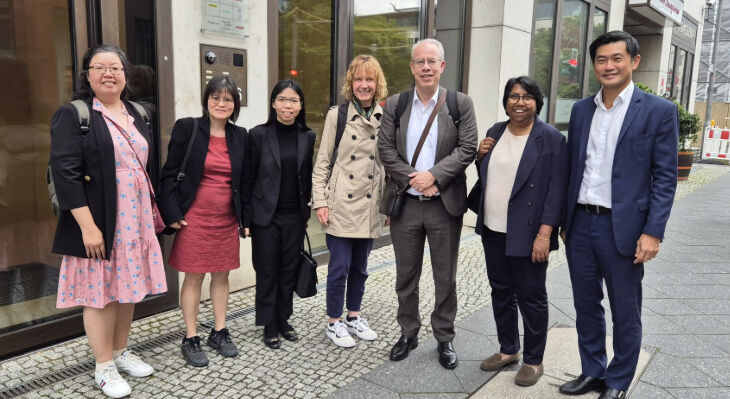Singapore: Transformation in Vocational Education and Training
21.06.2024
Education and training in the transformation process is also of great importance to PISA champion Singapore. Mechanisms of qualification for the upcoming challenges also occupy the city state's trade unions and business community - a delegation gathered inspiration during a study trip.

The Singaporean delegation, led by K Thanaletchimi, President of the Healthcare Services Employees' Union (HSEU) and member of the Central Committee of the National Trades Union Congress (NTUC), visited institutions and companies in the training context, focusing on the role of trade unions and the interaction between business, politics and social partners in training practice. Stops on the visit included the German Trade Union Confederation (DGB), IG Metall, the German Chamber of Industry and Commerce (DIHK), the Federal Ministry of Labour and Social Affairs (BMAS), the High Technology Education and Training Network (ANH Berlin) and companies such as Siemens and Continental. The delegation also included Desmond Tan, Deputy Secretary-General of the NTUC, responsible for TVET within his position as Minister of State in the Prime Minister's Office, and Caryn Lim, Director of the NTUC's Employment and Employability Institute.
GOVET organised the visit together with the German Trade Union Confederation (DGB), focusing on the topic of further training in the transformation. After a general introduction to the Partial Qualifications (in German: TQ for "Teilqualifikation") project at the DIHK, the visit to Continental provided information on how partial qualifications help to exploit the potential of employees and equip them for the new challenges in society and the world of work. As the manufacture and production of semiconductors is also of great importance in Singapore as a key technology for digitalisation, the guests visited the High Technology Education and Training Network (ANH Berlin), coordinated by Ferdinand-Braun-Institutes, on the Adlershof research campus. The management there showed the guests the interplay between academic and non-academic education and training with a practical insight into the "microchip" supply chain, in particular the networked training of companies and research institutions.
During the concluding visit to the BMAS, Dr. Carsten Stender, Head of Department for International Employment, Social Policy and Digital Transformation, and Thomas Hildebrandt, Head of Division responsible for the qualification and further training of employees, answered key questions from the delegation. The focus was on qualification and the state's commitment to best prepare the population for the demanding years of transformation ahead. Both emphasized how far Singapore had already come in the digitalisation of labour market instruments and that Germany was following this with great interest.